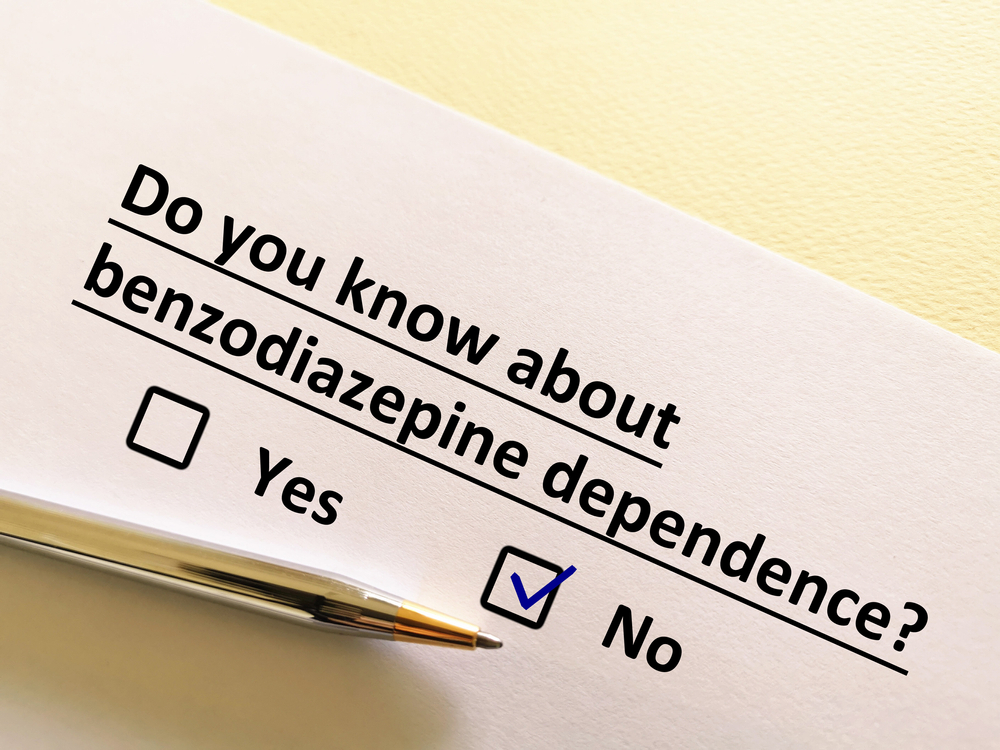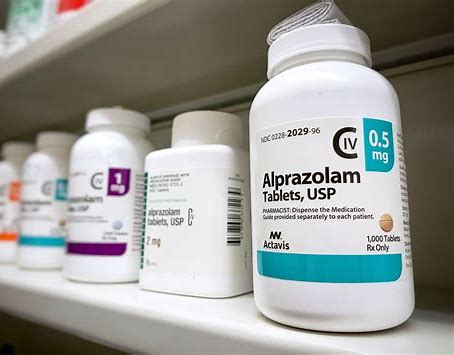While benzodiazepines are generally considered safe when used as directed, it’s important to note that long-term use can result in both physical and psychological dependence. It is important to understand the potential risks associated with this category of medications. By doing so, you can take the necessary steps to begin the process of benzo detox in the safest way possible.
What Are Benzos?
Benzodiazepines, commonly known as “benzos,” are a type of depressant drug that have a chemical structure combining a benzene ring and a diazepine ring.
Benzodiazepines have several properties that make them valuable in the treatment of various conditions. These conditions include anxiety, panic disorder, insomnia, agitation, seizures, muscle spasms, alcohol withdrawal, and as a premedication for medical or dental procedures. Benzodiazepines are classified into three categories based on their duration of action: short-acting, intermediate-acting, and long-acting.
How Do Benzos Affect the Brain?
Gamma-aminobutyric acid (GABA) is an incredible amino acid that plays a crucial role as the primary inhibitory neurotransmitter for our central nervous system (CNS). It’s like the calm conductor of our brain, helping to regulate and balance our brain activity.
Benzodiazepines are known as depressants because they increase the impact of GABA neurotransmitters. This leads to properties such as sedation, inducing sleep, reducing anxiety, preventing seizures, and relaxing muscles.
Side Effects of Benzodiazepines
Benzodiazepines are commonly considered to be safe and effective when used for a short period of time, typically around two to four weeks. However, there is ongoing debate surrounding the long-term use of this medication due to several concerns. These concerns include:
- Potential decrease in effectiveness over time
- The possibility of developing physical dependence
- Benzodiazepine withdrawal syndrome
- An increased risk of developing dementia and cancer
In general, some common side effects of taking benzodiazepines include, but are not restricted to:
- Respiratory depression (breathing becomes slower and shallower than normal)
- Respiratory arrest (breathing suddenly stops)
- Fainting
- Fatigue or drowsiness
- Vomiting or nausea
- Tremors
- Mental confusion
- Diarrhea
- Migraines or headaches
Potential Risks for Specific Individuals
Elderly individuals face a higher chance of experiencing negative effects from benzodiazepines, both in the short and long term. Consequently, all benzodiazepines are included in the Beers List, which identifies medications that are not recommended for older adults.
Additionally, there is still some uncertainty regarding the potential of benzodiazepines to cause congenital malformations, such as cleft palate in infants, and whether they can lead to neurobehavioral consequences when exposed during pregnancy. However, it is known that they can cause withdrawal symptoms or neonatal abstinence syndrome (NAS) in newborns.
How Does Benzo Dependence Develop?
Benzodiazepine dependence refers to a condition where an individual has:
- Developed tolerance to the drug
- Experiences withdrawal symptoms when trying to stop
- Engages in drug-seeking behaviors despite negative consequences
- Exhibits a harmful pattern of substance use.
Dependence on benzodiazepines can occur gradually, even when taken at low therapeutic doses. In the context of benzodiazepine dependence specifically, it appears that individuals continue using the drug to avoid experiencing unpleasant withdrawal symptoms rather than seeking pleasure from its effects.
Benzodiazepine Withdrawal Symptoms
Even when a patient who has developed a dependency on benzodiazepines is fully committed to their recovery, it can still take a significant amount of time to successfully stop using these medications. It is crucial for patients to have medical supervision through a benzo detox program when they try to stop using, as the withdrawal symptoms can be extremely severe and pose a significant risk to their health.
If you experience withdrawals from benzodiazepines, you may have some of the following symptoms:
- Abdominal cramps
- Aggressive behavior
- Anxiety
- Burning or itching skin
- Concentration problems
- Excessive sweating
- Hallucinations
- High blood pressure
- Loss of interest in sex or physical activity
- Memory loss
- Mild to moderate depression
- Nausea
- Panic attacks
- Paranoia
- Rapid heartbeat
- Restlessness
- Seizures
- Sleep problems
Over time, the prolonged use of benzodiazepines can pose an escalating risk to one’s health and well-being. In addition to causing dependence or addiction, prolonged use of benzodiazepines can lead to the body developing a tolerance. Unfortunately, this puts the individual at risk of continuously requiring higher dosages of the medication, making it more challenging for them to go through withdrawals during benzo detox.
List of Common Benzodiazepine Drugs
Valium®
Valium is a medication that helps reduce excessive brain activity to alleviate intense stress and anxiety. However, when an individual exceeds the prescribed dosage or uses Valium without a valid prescription, their likelihood of developing an addiction is heightened.
Although there are multiple factors contributing to Valium abuse, it is important to note that many individuals who misuse the drug do not do so with the intention of seeking a euphoric high. Individuals who consume Valium outside of their doctor’s prescription do so to experience a sense of normalcy, alleviate feelings of stress and anxiety, and take advantage of its sedative effects to aid in sleep. However, the misuse of Valium poses considerable risks that should not be overlooked or underestimated due to its addictive nature.
Valium detox without medical supervision may be dangerous. When trying to gradually wean off Valium, most people enroll in a benzo detox program that involves weekly dosage reductions. Doing so reduces the severity of unpleasant withdrawal symptoms and eliminates the risk of severe side effects.
Xanax®
Xanax is a potent medication belonging to the Benzodiazepine class. It is commonly prescribed by healthcare professionals to address conditions such as Generalized Anxiety Disorder (GAD), panic disorders, and insomnia. Long-term use of Xanax can lead to a highly addictive nature, making it a significant concern for addiction and abuse.
If a person wants to discontinue their use of Xanax after becoming dependent on the drug, it is not advisable to abruptly stop taking it without medical supervision through a benzo detox program. The severity of the symptoms can differ from person to person; however, if a person experiences convulsions, the process of discontinuing Xanax can potentially result in a fatal outcome.
Klonopin®
Klonopin is a medication that is commonly prescribed to help manage seizure disorders and panic disorders. It works by reducing certain bodily and brain functions that are associated with anxiety and stress.
It is possible to develop a dependence on Klonopin in as little as one month. If a situation arises where a person needs to stop using the drug, it is strongly recommended that they seek assistance from a professional benzo detox program for withdrawal.
Individuals who are dependent on Klonopin may encounter feelings of nausea and anxiety if they attempt to discontinue usage without professional benzo detox. These symptoms occur because the user’s brain and other bodily systems have developed a reliance on Klonopin in order to operate normally.
Treat Benzodiazepine Dependence in Pulaski, TN
Safe and comfortable withdrawal from benzodiazepines is possible with the help of a medically supervised benzo detox program. At Genesis Medical Detox, we provide round-the-clock medical supervision and care, as well as the use of non-addictive drugs to alleviate withdrawal symptoms and ensure the comfort of our patients.
Contact us today for a free insurance verification for our benzo detox program in Pulaski, TN.









